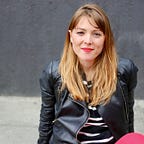What it is like to be a female founder.
Starting a company was the best decision I made.
In honour of International Women’s Day, here’s an illustration of what it has been like to a be a female founder.
- “What is your unfair advantage?”
- “What is it that you believe that other people don’t?”
- “What makes you contrarian?”
Just like you, aspiring founders (male or female), I’ve read those statements in 2016 from how VCs select which companies they fund, when I was considering to leave my day job to start a startup.
I was 30 years old, recently married, and no children.
Never, have I thought my gender played a role in the answer to any of those questions. I saw those as gender neutral questions. 4 years later, after building a company, raising 2 rounds of funding and exiting our start-up, I have a different opinion.
I read somewhere a statement of a powerful female CEO saying “ my gender is the least interesting part about me” — and I thought “yes, that makes sense! Why point it out? She is successful full stop. Not successful BUT a woman”.
I was caught by surprise on stage at the opening of Rocketspace in 2017 when asked by the moderator: “was it hard for you to raise funding as a female founder?”. I widened my eyes and replied what I believed to be true: “what does that have to do with anything? As long as you put in the work, you have equal opportunities to get funded”.
What I did not know back then, is that female founders clearly did not have equal opportunities. Out of $130 billion that were invested by Venture Capital firms in startups in 2018 only 2.5% went to startup female founded companies , 12% went to companies with at least one female founder and 76.6% went to all male founded teams. The industry’s response was immediate “ yes that’s because there aren’t enough startups WITH female founders who pitched to us”. A pipeline issue. It turns out this statement is unverifiable, because VCs do not have formal obligations let alone processes in place to record who they see, and which gender they belong to. You can’t improve what you don’t measure.
Now if you’re reading this and about to comment “ Marie, we’re a VC and we do track this!”. You should be proud! Having physically met with close to a hundred VCs in the last 4 years, in both Europe and Silicon Valley, you’ll be happy to know you’re an exception, not the rule. As an example, I was contacted by an associate at DN capital in London in 2019 saying she’d loved the podcast about our fundraising story (I had a newborn when we closed the round in 2018) and would love to hear more about Aiden.ai. My cofounder and I had met the partners 4 times during that fundraising round and I had a 3 weeks old baby when it happened. They respectfully passed on the opportunity to fund us that time. You get “no”s 95% of the time, so nothing out of the ordinary there. We thought at least we had great meetings and interesting conversations. Apparently not enough for them to keep even a trace of our visits in their records. The banality of that story is salient: we entrepreneurs are just passing by until we impress someone. A client for their business, a VC for their investment, a candidate for their application. But the numbers tell an interesting story: you are statistically much more likely to impress, if you are an all male founding team.
So now back to the subject of this post: What is it like to be a female founder?
It’s an extraordinary thing. Literally. Ignorance has been a blessing for the start of my journey, but realising that gender does play a massive role (and essentially adding unconscious bias and therefore obstacles in your entrepreneurial journey) has not made me depressed or self-conscious, it’s empowered me. It’s made me realise how much I lacked emotional intelligence and empathy. Telling myself, “I’m just a founder, not a female founder”, assuming I would be treated by key decisions makers, who are not from my gender, in the same exact way if I were a man or a woman . Now I know that it is not the case. And now I realise it is an immense asset.
- “What is your unfair advantage?”
- “What is it that you believe that other people don’t?”
- “What makes you contrarian?”
EVERYTHING about me.
The journey is the reward and it’s getting better every day thanks to our capacity as a society to challenge our own biases. The first step however, is to recognise we do have biaises (including me) instead of just pretending or not acknowledging (which is technically not lying) that we may have to think about how we can create a more equal landscape in industries where there is an overwhelming amount of one gender.
Happy international women’s day everyone, and keep starting companies 💪
